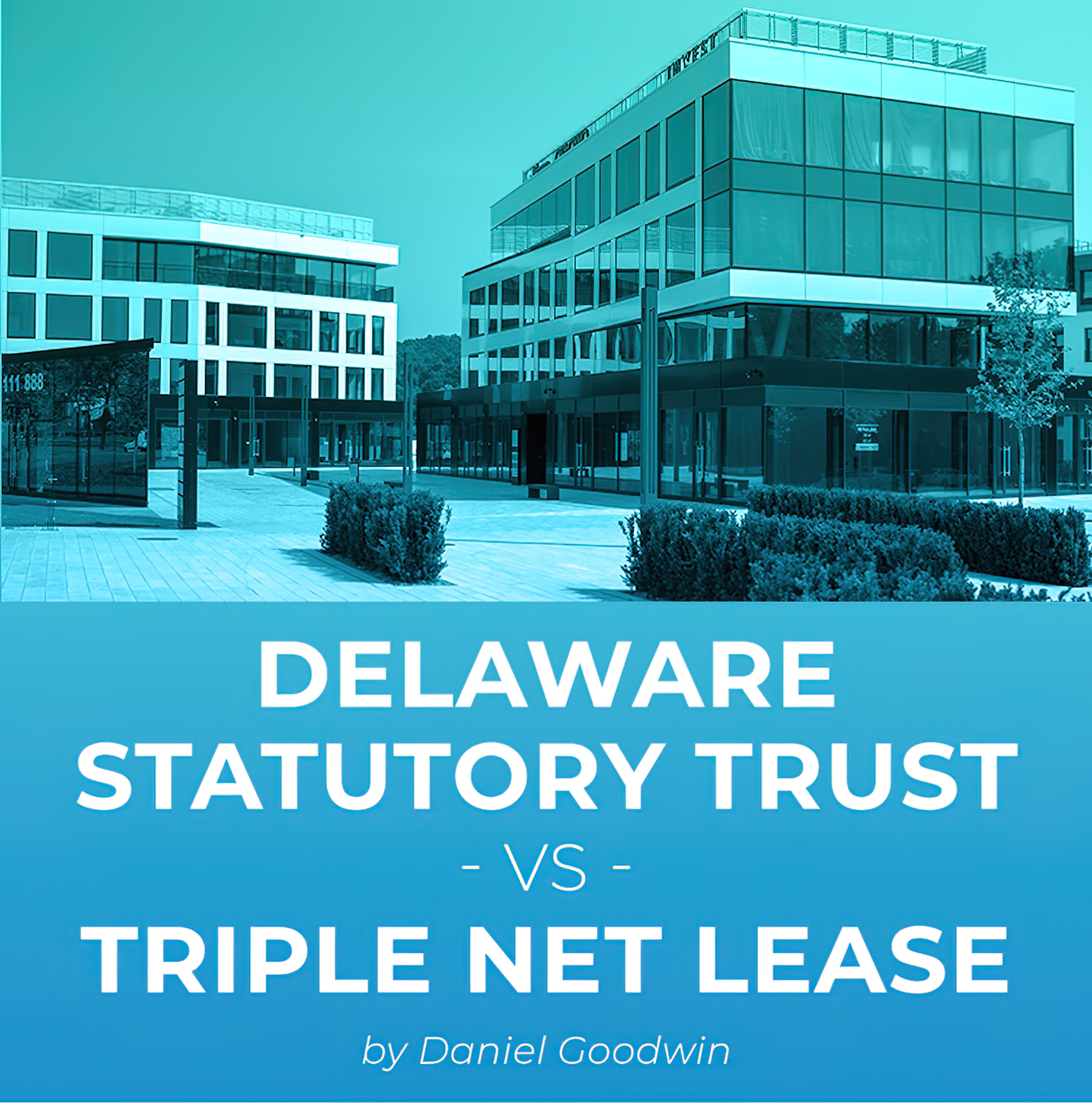Delaware Statutory Trust vs. Triple Net Lease

- What Is A Delaware Statutory Trust?
- How Does A Delaware Statutory Trust Work?
- Delaware Statutory Trust Formation
- Who Controls A Delaware Statutory Trust?
- How Is A Delaware Statutory Trust Taxed?
- Delaware Statutory Trust Fees
- Is A Delaware Statutory Trust A Good Idea?
- What Is A Triple Net Lease?
- Why Triple Net Leases Are Popular
- How Do You Calculate A Triple Net Lease?
- What Does A Landlord Pay In A Triple Net Lease?
- Triple Net Lease Tax Consequences
- Comparing Delaware Statutory Trusts vs. Triple Net Lease
- Summary
Commercial real estate is one of the most sought-after investments these days as it offers high income, appreciation potential, and significant tax benefits. However, it’s usually financially unobtainable for small and average-size investors. Smaller independent investors may still reap the benefits of institutional-quality commercial real estate by investing in Delaware Statutory Trusts.
How Does A Delaware Statutory Trust Work?
If you’re looking to sell your rental property and invest in something that will provide cash flow but eliminate the headaches associated with renting, selling your investment property and putting that money in the bank might seem like a good idea, but keep in mind that the banks’ interest rates today are exceeding low and inflation is rising and so an investor could find themselves going broke slowly with this idea. Moreover, you could pay up to 23% in capital gains tax along with up to 25% in federal tax on depreciation recapture.
If you invest your net gains into a DST property, you won’t pay any capital gains because the 1031 Exchange rules allow the DST to qualify as a replacement property option. DST property types may include multifamily apartment communities, office buildings, Amazon distribution centers, self-storage, medical offices, hotels, and many other property types.
Delaware Statutory Trust Formation
DSTs are usually formed by large national real estate investment firms.
Before the DST is formed, a private trust agreement must be developed to protect individual interests. Once all the required paperwork is complete and signed by all trustees, it’s submitted to the Division of Corporations, along with a one-time $500 processing fee.
Who Controls A Delaware Statutory Trust?
DSTs are controlled by the companies that formed the trust, usually referred to as DST sponsors. They’re in charge of the syndication of the property and organizing a DST offering for accredited investors. The sponsor can jointly act as the trustee, a manager, and a master lessee.
How Is A Delaware Statutory Trust Taxed?
In general, for real estate investors of a DST structure, all distributed gains from DST interest are taxed under the ordinary income tax code, however, an investor usually benefits from a new depreciation and amortization schedule which may shelter much of the tax on the income the DST provides.
Additionally, all of the gains upon the sale of the DST may be sheltered with a new 1031 exchange. DSTs generate passive losses so the investor generally finds the DST structure to be one of the most tax-efficient investment vehicles available today.
Delaware Statutory Trust Fees
As with all investments, several administrative fees are included in the formation of the DST ownership structure and its acquisition of real estate property.
These include:
Is A Delaware Statutory Trust A Good Idea?
A DST may be an excellent option for individual investors, as DST companies undertake management responsibilities and expenditures, while trustees involved in the fractional ownership of the trust enjoy beneficial interests.
As investment vehicles, DSTs allow smaller, individual investors an opportunity to acquire passive ownership in institutional-quality assets with minimum investments amounts and no landlord responsibilities.
Thanks to the relatively low minimum investment requirements and Section 1031 of the Internal Revenue Code’s property identification rules, investors can reinvest their proceeds from asset sales into several DSTs, creating risk diversification while offering other benefits as well.
Why Triple Net Leases Are Popular
Multi-tenant property owners prefer Triple Net Leases (NNN) because it allows them to offload the burden of property management and maintenance while still maintaining a dependable and steady cash flow.
How Do You Calculate A Triple Net Lease?
Considering that triple net leases are primarily leased to commercial tenants, rents are usually calculated per-annum: price per square foot is multiplied by total square footage.
For example, if the price per square foot is $20, and the total square footage is 2,000 square feet, the annual rent would be $40,000 per year. Monthly rent is calculated similarly, but the result is divided by 12.
What Does A Landlord Pay In A Triple Net Lease?
Though they significantly offload the management responsibilities, triple net leases still demand some attention from the landlord. This is because even though tenants pay triple-nets through their monthly rent, the landlord is the one making the payments. The landlord is making direct payments to property insurance, real estate tax, and property maintenance while being reimbursed by the tenant through monthly rent.
Triple Net Lease Tax Consequences
Triple net leases aren’t considered to be engaged in a trade or business and thus do not qualify for the 2017 Tax Cuts and Jobs Act 20% QBID tax deduction. Some states also consider them passive investment vehicles, for which the profits could be subjugated to the 3.8% net income tax.
Summary
DSTs can be a more hassle-free way to sell your investment property and invest your money in passively owned institutional quality real estate that could involve less risk than a NNN lease. Each DST and or NNN lease should be evaluated based on the merit of each investment. Investors are encouraged to read all offering documents carefully.
If you’re looking to sell your investment property and invest your money in a Delaware Statutory Trust, contact Provident 1031 and their team of professionals who can provide guidance, expertise and due diligence on specific DST offerings.





















